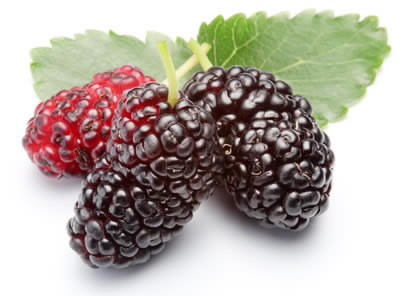Mulberry (Moraceae family) is a deciduous, fruit-bearing tree. There are ten type of mulberry tree. The usually well-known being black mulberry and white mulberry. Mulberry is rich in polyphenols, flavonoids, alkaloids, and anthocyanins, which have been suggested to be responsible for medical effects. In addition, one of the original property of the mulberry leaf is that it includes compounds that inhibit intestinal enzymes from passing sugars into the bloodstream. The Chinese Pharmacopoeia lists the fruit, leaves, and root bark as ingredients in pharmacological preparations.
Mulberry Benefits
Mulberry, are very rich in iron, for maintaining a healthful count of red blood cells and preventing anaemia. In Traditional Chinese Medicine this fruit are considered a blood tonic. Iron deficiency anaemia occurs when there isn’t sufficient iron in the body. The important symptoms of iron deficiency anaemia are tiredness, lethargy and shortness of breath.
Japanese scientists discovered that mulberry leaves include substance that inhibit intestinal enzymes from passing sugars into the bloodstream. A compound in mulberry leaves 1-deoxynojirimycin (DNJ), avoids diabetes according to scientists at the “Japan International Research Center for Agricultural Sciences“. This inhibitor compound can just be extracted from the mulberry leaf. In a study, taking 1 gram of the powdered leaf (white mulberry) 3 times a day for four weeks reduced fasting blood sugar levels by 27 percent, compared with an 8 percent reduce with the diabetes drug glyburide, 5 mg daily.
 Mulberries include anthocyanins, a strong type of antioxidant. As an antioxidant, anthocyanins help rid the body of the free radicals that cause oxidative damage in the body. In the lab, have been found to inhibit some human tumor cells. In a study showed that anthocyanins effectively halted colon cancer cell growth, killing 20 percent of the malignant cells without damaging non-cancerous cells. Mulberry anthocyanins, cyanidin 3-glucoside and cyanidin 3-rutinoside, exhibited an inhibitory activity on the migration and invasion of a human lung cancer cell line. Anthocyanins have demonstrated anti-oxidative and anti-inflammatory properties, and a high intake of anthocyanin have indicated positive effects on blood pressure and other cardiovascular risk factors. Mulberry includes cyanidin 3-glucoside (an anthocyanin), which epidemiological studies verify decreases the risk of degenerative ailments such as chronic arthritis and atherosclerosis. According to a study reported in the 2006 of the Journal of Medicinal Food, mulberry fruit extract provided anti-inflammatory activity for arthritic rats.
Mulberries include anthocyanins, a strong type of antioxidant. As an antioxidant, anthocyanins help rid the body of the free radicals that cause oxidative damage in the body. In the lab, have been found to inhibit some human tumor cells. In a study showed that anthocyanins effectively halted colon cancer cell growth, killing 20 percent of the malignant cells without damaging non-cancerous cells. Mulberry anthocyanins, cyanidin 3-glucoside and cyanidin 3-rutinoside, exhibited an inhibitory activity on the migration and invasion of a human lung cancer cell line. Anthocyanins have demonstrated anti-oxidative and anti-inflammatory properties, and a high intake of anthocyanin have indicated positive effects on blood pressure and other cardiovascular risk factors. Mulberry includes cyanidin 3-glucoside (an anthocyanin), which epidemiological studies verify decreases the risk of degenerative ailments such as chronic arthritis and atherosclerosis. According to a study reported in the 2006 of the Journal of Medicinal Food, mulberry fruit extract provided anti-inflammatory activity for arthritic rats.
Mulberries include resveratrol. Resveratrol also, an important antioxidant found in black grapes and red wine. Free radicals are unstable molecules that attack normal cells and damage membranes. As an antioxidant, resveratrol fights these free radicals to keep the cells and tissues normal and free from damage. The antioxidant effect of resveratrol helps to avoid damage to DNA, influences the transcriptions of genes responsible for redox metabolism and inhibits proliferartion of cancer cells. Resveratrol has been found to increase expression and activation of one substantial “suicide” pathway known as p53. Resveratrol dilates blood vessels to develop blood flow and increases nitric oxide production, which is a important Resveratrol part of healthful blood flow and heart health. A study, reported in the journal “Biofactors” in September 2010, found that resveratrol triggers the release of nitric oxide, which plays an significant role in relaxation of blood vessels. Resveratrol helps reduce inflammation and makes it more difficult for platelets to stick together and form the clots that can lead to a heart attack. In a January 2012 placebo-controlled study of forty patients who had suffered a heart attack, scientists at the “University of Pecs“, found that taking 10 mg of resveratrol daily for 3 months boosted endothelial function.
According to a study published in 2007 in the “Neuroreport“, mulberry leaf extract may play a role in preventing neurodegenerative ailments. Antioxidant effectiveness present in white mulberry leaves is gamma-aminobutyric acid (GABA) enriched, which may provide a neuroprotective feature against cerebral ischemia as well as neurotoxins. Neurological diseases known as Parkinson disease are associated with GABA reason to depletion in brain.
Leave a Reply